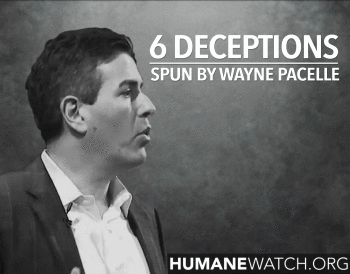USFWS Ruling is Killing the African Lion

It's human nature. When humans have a personal bias, it usually shows up somewhere. It is no different for scientists and their research. Remember the "cigarettes won't harm you" research from the tobacco industry in the 60's and 70's? And often, when it comes to scientific evaluation of the sport of hunting, trials, tests, research and data are sometimes skewed to prove or disprove the question, depending on author's personal views.
But it's not the case for Dr. Luke Hunter, the president and chief conservation officer of Panthera, a conservation organization whose mission is to ensure the future of wild cats through scientific leadership and global conservation action. Dr. Hunter, the author of six books and numerous scientific articles, has been involved in lion field research since 1992. Far from an unbiased researcher, Hunter has written that the sport hunting of lions "nauseates" me, and that "sport hunting big cats is repellent and I would welcome its demise." And though Dr. Hunter is clearly no friend of the hunter and viscerally opposes the practice of lion hunting, he is, unlike most radical anti-hunters, intellectually honest when it comes to the question of lion hunting; so much so that he opposes the US Fish & Wildlife placing the African lion on the endangered species list, as the ban is not in the best interest of lions.
Huh? One of the world's most accomplished big cat researches who personally detests hunting says that "protecting" lions from American hunters is not in the best interest of the species? The answer is yes. You see, Dr. Hunter knows sustainable use harvest by tourist hunters of the African lion is often the highest and best use of the species. Dr. Hunter knows without the infusion of large amounts of foreign exchange from these lion hunts, the plight panthera leo would be all the more dire.
Now don't get the idea that all lion hunting is good for the species. Often, the opposite is true. Unrealistic quotas and self-supervised enforcement means hunting not only risks taking too many lions, it also disrupts the species' complex social structure, as the killing of pride males leads to pride takeovers by new lions. The new male's first order of business is to kill the pride's cubs, a phenomenon known as infanticide, which causes the cub-less females to immediately become receptive to breeding. Practices such as these, along with human encroachment and loss of habitat have caused African lion numbers to have dropped to below an estimated 30,000 continent wide. But lion hunting can be sustainable. With proper quotas and mandatory harvest age limits to ensure that only older male lions are targeted, hunting is of great benefit to the lion as a species. But there is more to the lion equation than mere biology.

Tourist hunting is the main revenue earner for large tracts of African wilderness outside national parks and reserves, as hunters pay huge sums of money, sometimes in excess of $100,000, to harvest a lion which benefits the species in several ways. Hunting provides African governments with the economic incentive to leave safari blocks as wilderness that would otherwise be lost to cattle and crops. Put another way, sustainable-use lion hunting helps insure wild Africa stays wild. Hunting also creates an incentive for rural native Africans to protect the species from poachers, as a harvested lion generates financial returns that more than offset losses of livestock due to lion predation. But today, these incentives are gone thanks to a lion with a name...Cecil.
In textbook case of yellow journalism, the liberal media, Hollywood elite, and tree-hugging keyboard cowboys ginned up the public ire against American Cecil-hunter Walter Palmer to the point the Obama administration, ignoring the best science available, put a moratorium on the import of African lions. With the predictable fall in demand for lions hunts, Africans are now left with (dare I say it?) too many lions, which creates a quandary for African governments, concession holders, and private land owners.
Lions are an expensive species to maintain, whether in open bush or a fenced conservancy. Lions must be fed, and fed regularly. Whether preying on expensive and revenue-producing plains game species on communal or concession lands, or shooting a few donkeys every week to throw over the fence, lions extract a heavy toll or the land and pocketbook. Without an economic incentive to keep the big cats, many stakeholders today are euthanizing lions they can no longer afford to maintain. In a classic case of unintended consequences, the effective abolition of lion hunting is now the direct cause of the mass killing of hundreds, perhaps thousands of lions that are no longer economically viable. We did that. America did, though you aren't likely (read: never) to read about it in the Post or the Times.
Sustainable lion hunting provides a financial incentive that helps keep African wilderness as wilderness. US Fish & Wildlife's ban on the importation of lions has removed this protection of lions and their habitat, to the great detriment of the species; a fact upon which hunters and intellectually honest anti-hunters both agree. Hopefully, we will come to our senses before it is too late.





















